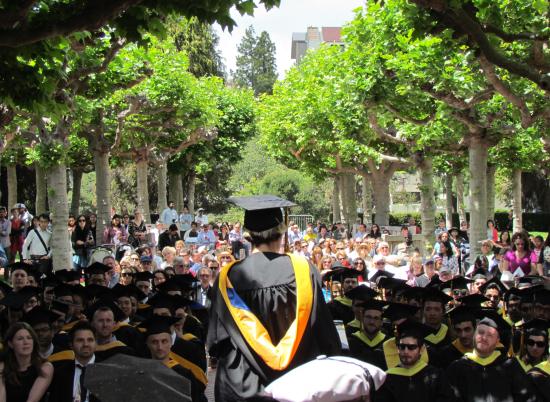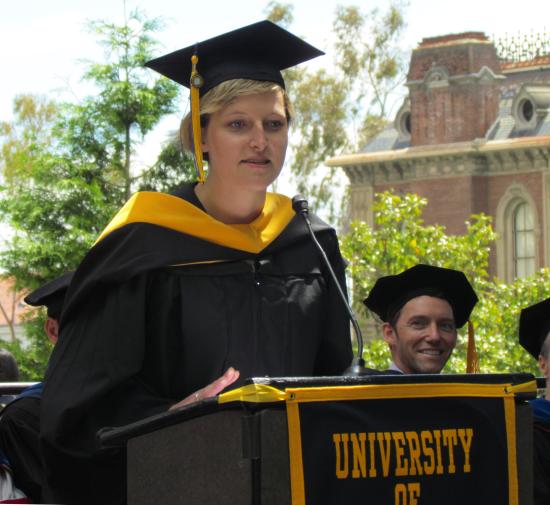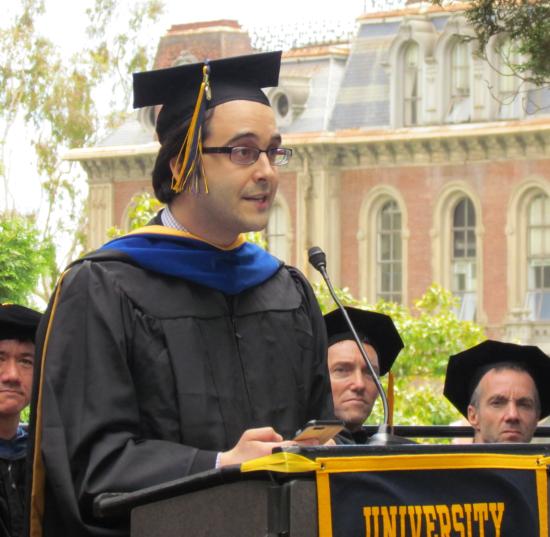“You can’t always get what you want, but… you get what you need,” sang Keith Richards and Mick Jagger.
But they got it exactly backwards, said Peter Norvig. “In today’s market-driven economy, you can’t always get what you need, but you get what you want.”
“We need better health care, clean water, food security for all, climate change mitigation, and social equality. But what do we get from the best and brightest of our generation? Angry Birds, Plants vs Zombies, cat videos, and photos that self-destruct in 5 seconds.”
Peter Norvig is the director of research at Google, Inc., and was the keynote speaker at today’s School of Information commencement ceremony. He addressed the 47 graduating MIMS students and 76 graduating MIDS students.
In his keynote address, Norvig challenged the graduates to focus on solving problems that really matter.
“When you think of what you’ll be writing about in your next academic paper, or what project you’ll be doing in your next job, don’t just think about data science, information visualization, statistical inference, and probabilistic reasoning. Think also about utility science, desire visualization, and ethical calculus. Build systems that protect the desires of the few as well as the many. Design algorithms with payoffs that ensure a sustainable future as well as a near-term return on investment.”
“By all means use your skills to do optimization, but be aware that unless you make explicit choices, optimization can lead to homogeneity, not diversity, to concentration of wealth, not empowerment for all.”
He closed his speech by quoting Spike Lee: “It is up to you to ‘Do the Right Thing.’ ”
Student Speakers
Both student speakers took the opportunity to try to explain each degree program to the guests.
“MIDS is an online data science program,” explained Christopher Llop, the MIDS student speaker. “It’s a flipped classroom — we watch a few hours of carefully curated video content a week, then we meet. And when we meet online, it isn’t like what you’d expect. The classes are small: eighteen people in a room. And I like to explain that it looks like the introduction to the Brady Bunch — each student’s face is displayed at once in a little box, with a separate module for the instructor to share their screen, walk through slides, etc.”
“The commute is wonderful,” said Llop; “Just go to the internet and sign on. But this also brings some new and interesting ethical dilemmas such as, ‘should I hide wine in my coffee mug’ or ‘do I even need to wear pants to school today?’ ”
Emily Paul spoke on behalf of the graduating MIMS students, asking the question, “What does it mean to have a master’s from the School of Infromation?”
“I know many of us are tired of trying to explain our degree to people,” she observed. “Now this may seem to be a burden, but really I see it as a great benefit.” She observed that the world is unavoidably complex, and MIMS students have learned to resist oversimplistic solutions to complicated problems. In the same way, Paul suggested her classmates should resist the allure of an overly simplistic definition of the degree.
At first Paul thought that her take on the ambiguity of the MIMS degree was “a pretty deep and thoughtful insight” — until she watched videos of previous graduation speakers expressing the same idea multiple times. “This unshakable belief that an idea of mine was completely original and world-changing sets me up pretty well to be a tech bro,” she joked.













